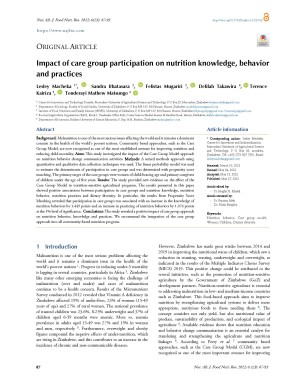Impact of care group participation on nutrition knowledge, behaviour and practices
Abstract
Background: Malnutrition is one of the most serious problems affecting the world and it remains a dominant issue in the health of the world’s poorest nations. Community based approaches, such as the Care Group Model, are now recognized as one of the most important avenues for improving nutrition and reducing child mortality. Aims: This study investigated the nutrition impact of nutrition behaviour change communication activities using the Care Group Model approach. Methods: A mixed methods approach using quantitative and qualitative data collection techniques was used. We employed the linear probability model to estimate the determinants of participation in care groups, and we used propensity score matching to determine the impact of the care group approach. The primary target of the care groups were women of child-bearing age and primary caregivers of children under the age of five years. Results: The study offers three major findings: (i) age, family composition and livelihood source of the household are related to household participation in Care Groups, (ii) participation in Care Groups positively impacts household nutrition knowledge and practicing of positive nutrition behaviours, and (iii) household participation in Care Groups positively impacts dietary diversity. Conclusions: The study revealed a positive impact of CGM approach on nutrition behaviour, knowledge and practices. We recommend the integration of the care group approach into all community-based nutrition programme.
Key-words: Nutrition behaviour, Care group model, Women, Children, Dietary diversity.
Full text article
Authors
Copyright (c) 2022 Lesley Macheka, Sandra Bhatasara, Felistas Mugariri, Delilah Takawira, Terence Kairiza, Tonderayi Matsungo

This work is licensed under a Creative Commons Attribution 4.0 International License.
-
Attribution — You must give appropriate credit, provide a link to the license, and indicate if changes were made. You may do so in any reasonable manner, but not in any way that suggests the licensor endorses you or your use.
-
No additional restrictions — You may not apply legal terms or technological measures that legally restrict others from doing anything the license permits.





